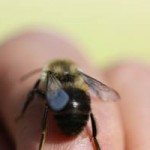TORONTO, December 5, 2011 – Bees may miss pollinating entire species of plants if climate change continues unchecked, according to a study released today by a group of academic and museum collaborators including a York University researcher.
 The study, led by Rutgers University, finds that bees are emerging earlier each spring, advancing their life cycle by nearly a day per decade.
The study, led by Rutgers University, finds that bees are emerging earlier each spring, advancing their life cycle by nearly a day per decade.
"This may become a case of ‘missed connections’ in terms of bees and the plants they need to pollinate," says Sheila Colla, York University PhD biology candidate and study co-author. "So far, bees and plants are keeping pace with each other, but this may not be the case as rates of temperature warming increase."
Scientists call this phenomenon a "phenological mismatch” – when the life-cycles of dependent species fall out of sync with one another.
"In the case of bees, [this mismatch] hasn’t happened yet," Colla says. "The concern is that some plant species will not respond to climate change in the same manner as their pollinators," she says.
The study looked at the past 130 years of data on ten species of wild bees that emerge in the early spring in eastern North America, comparing it with published studies of bee-pollinated plants over the same time period.
Results show that life-cycle changes in bees have paralleled changes in the plants they visit. Both bees and plants responded to temperature increases from 1971-1999 by more than doubling their rates of phenological advance, suggesting a parallel response to climate change.
"So far, there is only a small difference between bees and plants in terms of their response to climate change, noted in only a handful of species. But, this small difference is worrying," Colla says. Of particular concern is the finding that plant studies conducted in cities showed greater rates of advance for species that emerge earlier in the season.
"This suggests more investigation into the effects of temperature warming in urban environments is needed," says Colla. She emphasizes that potential problems aren’t just limited to pollination.
"Many ecological functions result from interactions among species, and because not all species respond to climate warming in the same manner, this could potentially lead to phenological mismatches that result in the loss of function. In other words, this could result in serious challenges for many different forms of animal and plant life."
Colla conducted her research under the supervision of York University biology professor Laurence Packer as a PhD student in the Department of Biology, Faculty of Science & Engineering.
The study, "Climate-associated phenological advances in bee pollinators and bee-pollinated plants," was published in the journal Proceedings of the National Academy of Sciences (PNAS).
The research was funded through a Natural Sciences and Engineering Research Council of Canada (NSERC) Alexander Graham Bell Canada Graduate Scholarship to Colla.
York University is the leading interdisciplinary research and teaching university in Canada. York offers a modern, academic experience at the undergraduate and graduate level in Toronto – Canada’s most international city. The third largest university in the country, York is host to a dynamic academic community of 55,000 students and 7,000 faculty and staff, as well as 240,000 alumni worldwide. York’s 10 faculties and 28 research centres conduct ambitious, groundbreaking research that is interdisciplinary, cutting across traditional academic boundaries. This distinctive and collaborative approach is preparing students for the future and bringing fresh insights and solutions to real-world challenges. York University is an autonomous, not-for-profit corporation.
-30-
Media Contact:
Melissa Hughes, Media Relations, York University, 416 736-2100 ext. 22097, mehughes@yorku.ca

